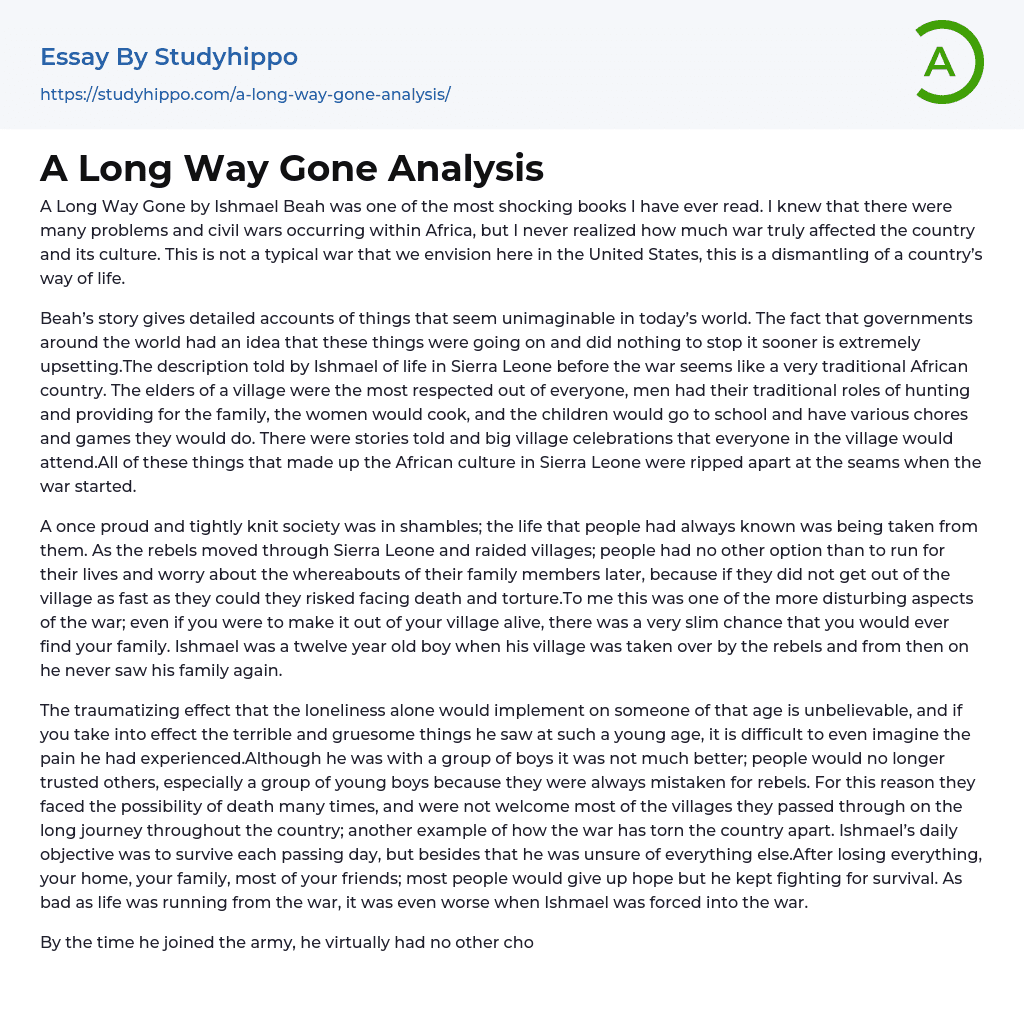After reading A Long Way Gone by Ishmael Beah, I was deeply affected. This book is truly remarkable and highlights the devastating effects of war on African nations. Despite my prior knowledge of various conflicts in Africa, this book provided me with a deeper understanding of how these conflicts can destroy a country's culture and way of life - something vastly different from wars typically experienced in the United States.
In his narrative, Beah delves into intricate details of events that may seem unimaginable in today's society. It is disheartening to note that despite the knowledge of the atrocities committed, various governments across the world failed to take prompt action. Ishmael portrays life in Sierra Leone prior to the war as typical for an African nation where respect was given to the elderly, men provided for their families through hunting, women c
...ooked, and children went to school and engaged in games and tasks. The village would come together during grand celebrations and share folktales. However, when the war began, it tore apart the cultural fabric of Sierra Leonean society and destroyed everything that had once been cherished.
The rebels' raids on villages in Sierra Leone caused widespread devastation and forced residents to flee for their lives, resulting in the fragmentation of a once close-knit community. Survivors were compelled to leave quickly to evade torture and death, but even if they survived, it was doubtful that they would be reunited with loved ones. The author lamented this reality by recounting the tragic tale of Ishmael, a twelve-year-old boy who lost his family when rebel forces overtook their village.
As a young person, Ishmael experienced profound loneliness that was exacerbated
by the terrible acts he witnessed and suffered. Though he was around other boys, trust was hard to come by, leading to frequent threats of death and rejection from villages on their journey. For Ishmael, simply surviving became his daily goal after losing his home, family, and most friends. Nevertheless, despite these challenges, Ishmael persisted in his efforts to escape the horrors of war that had forced him into participation.
Enlisting in the army was his only choice after a traumatic experience that left his family murdered and seeking revenge. The unbearable past experiences of a teenage boy led to excessive drug use, causing mental and physical deterioration and distorting reality. Despite knowing the damaging effects of drugs on soldiers, the army continued administering them for their own advantage.
The purpose of developing the drug brown-brown was to enhance children's aggressive behavior and induce unpredictable actions. Its combination with other drugs enabled them to stay awake for extended periods without sleep. For many kids in Sierra Leone, their existence revolved around war, substance abuse and viewing violent movies, leading to a lack of childhood experiences. This is a frequent happening and child soldiers go through severe psychological trauma which can be almost unbearable. Upon leaving their violent surroundings, they have to face the consequences of their actions throughout the years - a challenge that can prove even more difficult than being amid warfare.
Overcoming withdrawal symptoms from potent drugs would be difficult for Ishmael, especially as he was accustomed to having an unlimited supply. Furthermore, he has acknowledged that he became a killing machine without awareness and is troubled by the guilt of mercilessly taking lives of those
in similar circumstances, which disturbs his sleep. Given these horrifying memories and images, one might wonder how Ishmael recuperated from his encounters and resumed a normal state.
The war-torn surroundings of Sierra Leone were vastly different from our own environment, with no rules of engagement or repercussions for soldiers' actions resulting in total anarchy during the civil war. Despite experiencing a traumatic childhood, Ishmael was able to emerge mentally sound and continue living a content life, which is truly remarkable. What sets Ishmael apart in the novel is his ability to recall day-to-day details even years after the events took place, including memories from early childhood and experiences while under the influence of mind-altering drugs.
The author faced challenges in writing the book, as memories of a tragic past made it difficult. However, this adds to the significance of the work because the author felt it was crucial for global attention to be brought to and solutions found for issues affecting African children.
- 1984 essays
- A Farewell to Arms essays
- A Good Man Is Hard to Find essays
- A Hanging essays
- A Lesson Before Dying essays
- A Long Way Gone essays
- A Rose For Emily essays
- A Separate Peace essays
- A Tale Of Two Cities essays
- A Very Old Man With Enormous Wings essays
- Adventures Of Huckleberry Finn essays
- Alice in Wonderland essays
- All Quiet on The Western Front essays
- Allegory of the Cave essays
- An occurrence at owl creek bridge essays
- Animal Farm essays
- Anthem essays
- Antigone essays
- Arthur Conan Doyle essays
- As I Lay Dying essays
- Atticus Finch essays
- Barn Burning essays
- Battle Royal essays
- Beauty and The Beast essays
- Beloved essays
- Boo Radley essays
- Brave New World essays
- Candide essays
- Castle essays
- Characters In Hamlet essays
- Characters In Romeo And Juliet essays
- Christmas carol essays
- Chronicle of a Death Foretold essays
- Cinderella essays
- Crime and Punishment essays
- Daisy Miller essays
- Death of a Salesman American Dream essays
- Desdemona essays
- Diary Of A Wimpy Kid essays
- Dracula essays
- Dubliners essays
- Emma essays
- Ender'S Game essays
- Ethan Frome essays
- Eveline essays
- Fahrenheit 451 essays
- First-Person Narrative essays
- Fish Cheeks essays
- Frankenstein essays
- Genesis essays




